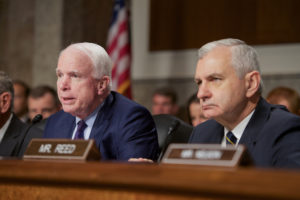
U.S. Senator John McCain, chairman of the Senate Armed Services Committee, sits with U.S. Senator Jack Reed, the panel’s Ranking Member, on July 29, 2015. [State Department photo/ Public Domain]
These realists are pushing the idea that interventionism in foreign affairs has led to a bloody, wasteful legacy of failure for America and ought to be reined in. Led by Senator Rand Paul, the realists have recently forced a vote on the authorizations for the use of military force (AUMF) that gave presidents Bush and Obama nearly unfettered latitude to prosecute the wars in the Middle East.
Despite a Senate filled with neocon members publicly critical of President Trump, 61 senators voted to continue allowing him to exercise power over Congress’s constitutionally mandated war-making role.
As long as congressmen are willing to abrogate their war powers, there will never be broad debate over America’s role in any war. Without broad debate, the American people will be led by Neocons from one quagmire to another. Lewis writes:
They could caucus in a phone booth. They are known as “realists,” and their default position on questions of foreign policy and national security is one of skepticism about the value of interventions abroad and of respect for privacy at home. In a debate largely being litigated within the ranks of the Republican Party on Capitol Hill, the realists don’t have a prayer of prevailing in an up-or-down vote against the neoconservative wing of the party, proponents of an interventionist ethos to embed American values in lands far removed from domestic shores and traditions.
And yet the realists soldier on. They consider restraint a virtue and argue that foreign military adventures inevitably entail unpleasant and unforeseeable consequences. To nobody’s surprise, the realists were trounced on September 13 when the Senate slammed the door on Kentucky Senator Rand Paul’s challenge to the legal authority that administrations of both parties have embraced since 9/11 to wage war.
Within the ranks of the congressional realists are two Capitol Hill lifers—Representatives John Duncan of Tennessee and Walter Jones of North Carolina. Both became realists with the votes they cast years ago on U.S. military intervention in Iraq. The other realists brought their worldview with them as they entered Congress: Rand Paul and Senator Mike Lee of Utah, and Representatives Justin Amash of Michigan, Thomas Massie of Kentucky, and Brat.
At least one Democrat, Representative Tulsi Gabbard of Hawaii, consistently reflects a realist position in her votes and public statements. Other Democrats can be counted on for support on particular issues:
After running in the 2008 GOP presidential primaries, Ron Paul refused to endorse McCain, the eventual nominee. In an op-ed posted last spring on CNN, Rand Paul took aim at McCain and his close political ally, Lindsey Graham of South Carolina: “They’ve been wrong about every major intervention of the past two decades in the Middle East. Maybe it is time to quit listening to them.”
Asked how American policy would be different if realists were in charge on Capitol Hill, Massie says, “It would involve a much smaller global footprint for the United States.…We would leave Afghanistan. We would not be trying to engage in another war in Syria. I think we need to listen to South Korea on the issue of North Korea. They stand to have millions of casualties in the first few hours of a war with North Korea.”
Gabbard attributes the nuclear- arms standoff on the Korean peninsula to “decades of U.S.-led regime change wars.
Read more here.
If you’re willing to fight for Main Street America, click here to sign up for my free weekly email.





